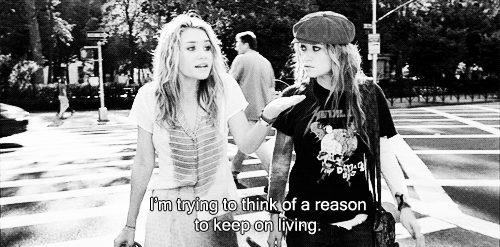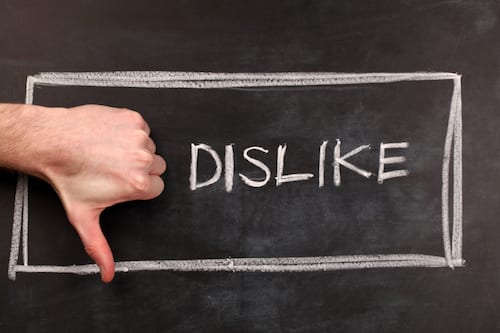Your friends are your rock; you can always count on them for a good laugh or a shoulder to cry on. You’d be lost without them, right? Well, not necessarily. Your friendships could actually be hurting you and your health much more than you might think. Some friends might be unhappy or unhealthy themselves, but you shouldn’t be afraid to move on from friends who are just plain bad news for your health. We asked collegiettes to share their bad friendship experiences, and we checked in with experts to make sense of these situations and help you (and your friend!) through some sticky situations.
1. Their unhealthy habits influence you
![]()
The situation
You probably have a lot in common with your friends; that's why you’re friends in the first place! Even if you don't like some of the things your friend does, spending time with her might make her habits rub off on you. This can be a great thing, an opportunity to grow and evolve – unless her habits have the potential to hurt you.
“Drinking or eating too much, smoking, spending too much are bad habits that can rub off from a friend,” says Irene S. Levine, PhD, psychologist, friendship expert and producer of The Friendship Blog. “When you see someone doing something to excess, it can make you lose your perspective and act the same way.”
Samantha*, a senior collegiette, is all too familiar with this situation. “I've had some friends with unhealthy body image/eating habits. It's very easy for those behaviors to rub off on me,” she says. “Although I love my friends, I can't handle the constant negativity and bizarre eating habits. I have to distance myself and remember that I can't allow myself to fall into that trap.”
Why it happens
We’re strong, ambitious collegiettes, and we (usually) know how to make the right decisions! So why are we so easily influenced by our friends' habits? Jessica Rozler, co-author of Friend or Frenemy?, explains: “Bad habits influence us because – let's face it – some of these things can be fun.”
This makes a lot of sense, especially since we often want to look back on our college years as the most fun time of our lives. “Take, for example, the friend who parties too much,” Rozler says. “She's always down for a good time and puts her school work low on her priority list. If you are buried in your studies, it's very tempting to join her during her nights on the town when you should really be doing work.”
As for much less seemingly fun bad habits, like Samantha's friends’ eating patterns, Dr. Levine explains that the influence can stem from our having similar tendencies to start with. In this situation, our friend would just bring out these tendencies in us rather than create them.
How to deal
So your friend encourages you to engage in activities that make you uncomfortable or put you at risk. What should you do? “If you have a friend who is prone to dangerous or risky behaviors, you may want to limit your interactions,” especially if you find yourself tempted to imitate her, Dr. Levine says.
But there is a second solution, Dr. Levine says. “Another approach is to see her in a group, so that peer pressure will curtail unhealthy behaviors,” she says. Dr. Levine explains that “while it’s easy to dismiss one other person challenging your behaviors, it’s more difficult to do that to a group.”
So if you are the only one to call your friend out on something she does, it will be easier for her to deny it or get defensive. “Peer pressure often can be very motivating in getting someone to reexamine his/her behaviors.” If you are worried about someone's behavior, try talking to mutual friends about it first. If they agree with you, it will be easier to confront the friend in question as a group.
2. You compare yourself to them
![]()
The situation
If a friend of yours has low self-esteem and repeatedly lists her perceived faults and failings, you might become more likely to see those same faults in yourself by comparison.
This has happened to Clara*, a senior at Pennsylvania State University. “When a friend is putting herself down for how allegedly fat or ugly she is, and I'm sitting there confused because I think she’s neither of those things, sometimes it makes me doubt myself,” Clara says.
Conversely, if your friend is very confident and seems perfect to you, you might feel unworthy compared to her.
Why it happens
Don't worry if you have a tendency to compare yourself to others, because “comparing ourselves to our friends is natural,” Dr. Levine says. “Unless it is to excess, it can be motivating. A thin friend can help motivate us to lose weight. A brainy friend can encourage us to study more, etc.”
But on the other hand, “if you lack confidence, you may not see your friend realistically and underestimate the traits you have that she might envy,” Dr. Levine says.
How to deal
Rozler offers a simple solution to avoid negative self-talk within your group of friends: “just refuse to participate. Change the topic or simply say that you don't want to talk like that.” But if this method doesn't work and “you always feel bad about yourself after spending time with a friend, you really need to reevaluate that friendship,” she says.
If you have the opposite problem, that is, envying an apparently flawless friend, “just don't do it,” Rozler warns. “Two very true clichés: You are your own worst critic, and the grass is always greener on the other side of the fence.”
Your friend might seem perfect, but she also “has her flaws and insecurities, just like we all do,” Rozler points out. “I guarantee that she admires and envies things about you and thinks that you have it really good in some ways.”
Bottom line: as hard as it may be, try to maintain a positive and realistic outlook on yourself. Comparing yourself to your friends, whether they’re insecure or perfectly confident, has a good chance of bringing you down – unless you use it as healthy motivation.
3. They pressure you into certain behaviors
![]()
The situation
Usually our friends have our backs. But sometimes a so-called friend will make us feel obliged to engage in something we don't want to do. “I’ve been in situations where if men have bought me a drink, a friend of mine has said, ‘Well, now you have to hook up with him,’” says Maria*, a senior at New York University.
Peer pressure is pervasive in middle and high school, but it most definitely doesn’t stop happening in college. Your friends might pressure you to drink, use drugs or, like Maria, hook up with people for all the wrong reasons. The NYU collegiette says she feels inadequate in these situations, especially “after a lifetime of being told not to settle and not to tone down [her] personality.”
Why it happens
Dr. Levin says, “sometimes, in the face of a friend’s urging, it becomes very difficult to exercise self-control and say ‘no,’” which can lead to a dangerous situation.
How to deal
If one of your friends has a tendency to pressure you into doing things you’re uncomfortable with, try seeing her in a group or planning ahead to hang out in a “safe zone,” like a restaurant, a movie theater or the mall.
However, if you think your friend's behavior is endangering her health as well as yours, “you should express your concern to her and also let her know that you're worried about her,” Rozler says. This will be a difficult conversation to have, but following this advice should help. “In general, be direct, don't accuse her of anything and express that you really care for her,” Rozler says.
Expect that the conversation might not go as planned, and “if she doesn't want to change her lifestyle or reacts in a hostile way, you'll have to distance yourself from the friendship,” Rozler warns.
4. They take more than they give
![]()
The situation
A friendship is an exchange; both of you should be giving as much as you take. If your friend expects more from you than you can possibly give her and gives very little in return, it can become a problem.
A one-sided relationship where you’re always on the giving side can really take its toll on your health. “You might feel like you are being taken advantage of,” Dr. Levine says.
Isabel*, a senior at Franklin & Marshall College, once had a friend like this. “[She] would just dump all her drama on me and call me in tears asking me to make it all better when I had my own drama,” she says. This was too much for Isabel: “I later told her that I was sick of the drama and that I couldn't handle it anymore.”
How to deal
It is up to you to “assess whether the relationship is really reciprocal and worth keeping,” Dr. Levine says. Indeed, there is a difference between a friend who doesn’t give back once or twice and a friend who fails you time and time again. Nobody’s perfect, but a true friend should have your back.
If you really care about a friend who has been taking too much from you lately, consider talking to her about it. This will be as difficult as confronting her about a dangerous habit, but Dr. Levine's guidelines are a great place to start. Her advice? “Get the facts before you make accusations, try not to blame the other person, spend at least as much time listening as you do speaking,” she says.
Timing is also key. “Save discussions for when tempers have settled down and make sure you pick the right time and setting,” Dr. Levine says. Even if your friend doesn't react well at first, hopefully in time she will understand your point of view and realize that she needs to change.
5. They put you down
![]()
The situation
A good friend should lift you up, make you laugh and make you feel happy and confident—not bring you down! Yet sometimes someone close to you might make you feel bad about yourself, whether purposefully or not.
“A former friend of mine, who I stopped talking to for this and many other reasons, used to try to make herself seem better than those around her by a ‘career ethic,’” Maria says. “She would ask people what kind of jobs/internships they got, belittle them, or, if they didn't have one, state how their life was going nowhere or that she was somehow going to succeed solely based on these assumptions.”
Why it happens
There are various reasons why your friend might belittle you regularly. “Some friends put us down in an effort to build themselves up,” Dr. Levine says. “They may be jealous or suffer from low self-esteem.”
As for more passive-aggressive remarks, “your friend may be angry at you for something she hasn't expressed and it seeps out as underhanded criticism,” Dr. Levine says.
Finally, Rozler says your friend's trash talk “might be so subtle that she doesn't even know she's doing it.”
How to deal
A so-called friend putting you down is never okay, and “if it's destroying your sense of self-worth, this is not a true friend,” Rozler warns.
With that in mind, both experts agree that this girl might be struggling with her own self-esteem. If this is the case and she has been a good friend in the past, “it might be helpful to point out her strengths so she feels better about herself,” Dr. Levine suggests.
If you think your friend is angry at you for some reason, “you might want to call her out on her behavior and explain the effect her put-downs are having on your friendship,” Dr. Levine says. Either way, communication is key.
![]()
If being around a certain friend is hurting your physical or mental health, don’t be afraid to walk away. However, if your friend puts you or herself down on a regular basis, this could be a cry for help. Ultimately, it’s up to you to distinguish between hopeless situations and ones where your friend simply needs you.
*Names have been changed.
































































































































































